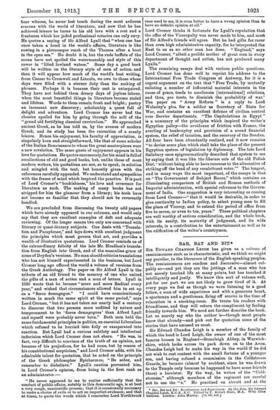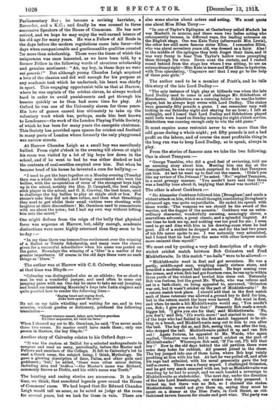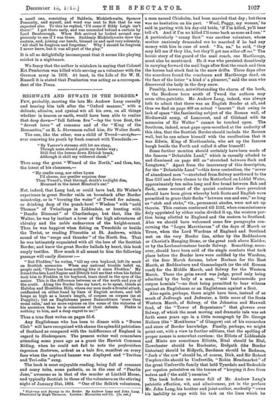BAR, BAT AND BIT.• SIR EDWARD CHANDOB LEIGH has given
us a volume of reminiscences such as is characteristic, and we think we might say peculiar, to the literature of the English-speaking peoples. The reminiscences are random and discursive—almost cul- pably so—and yet they are the jottings of a man who has not merely touched life at many points, but has touched it intelligently and justly. We know this sort of volume well, yet for our part we are not likely to grow tired of it. At every page we feel as though we were listening to a good fellow, a man of wide experience and with a generous heart, a sportsman and a gentleman, firing off stories in the time of relaxation in a smoking-room. He treats his readers with friendliness, and they will return the compliment by feeling friendly towards him. We need not further describe the book. Let us merely say who the author is—though most people know that already—and pick out for quotation some of the stories that have amused us most.
Sir Edward Chandos Leigh is a member of the family of which the bead is Lord Leigh, the owner of one of the most famous houses in England—Stoneleigh Abbey, in Warwick- shire, which looks across its park down on to the Avon. Chandos Leigh had to make his way in the world if he did not wish to rest content with the small fortune of a younger son, and having refused a commission in the Coldstream Guards, he became (almost by accident, since he was drawn to the Temple only because he happened to have some friends there) a barrister. By the way, he writes of the " Cold- streams," although members of the regiment are careful not to use the "a." He practised on circuit and at the • Bar, Bat and Bit : Recollections and Experiences. By the lion. Sir Edward Chandos Leigh, K.C.B., K.C. Edited by F. Robert Bush, M.A. With Illus- trations. London : John Murray. [7s. Gd. net.] Parliamentary Bar ; he became a revising barrister, a Recorder, and a K.C.; and finally he was counsel to three successive Speakers of the House of Commons. He has now retired, and we hope he may enjoy the well-earned leisure of his old age for many years. He was a Fellow of All Souls in the days before the modern regulations came into force—the Says when companionable and gentlemanlike qualities counted fur more than scholarship. Those were the times of which the uniqueness was once lamented, as we have been told, by a former Fellow in the following words of atrocious scholarship and genuine sentiment : "Alt, my boy, in those days tee were sui gencris l " But although young Chandos Leigh acquired a love of the classics and did well enough for his purpose at any academic task which he undertook, his heart was chiefly in sport. This engaging opportunist tells us that at Harrow, where he was captain of the cricket eleven, he always worked hard in order to avoid punishments and get through his lessons quickly as he then had more time for play. At Oxford he was one of the University eleven for three years. His love of games caused him ultimately to take up the voluntary work which has, perhaps, made him best known to Londoners—the work of the London Playing Fields Society, of which he has been for many years the energetic chairman. This Society has provided open spaces for cricket and football in many parts of London where formerly the only playground was narrow streets.
At Harrow Chandos Leigh as a small boy was mercilessly bullied. From eight o'clock in the evening till eleven at night his room was visited by a lot of big boys low down in the school, and if he -went to bed he was either ducked or had the contents of coal-scuttles emptied over him. But when he became head of his house be invented a cure for bullying :— " I used to get the boys together on a Monday evening (Tuesday then was a whole holiday), and having ascertained who were the bullies, with the co-operation of some of the strongest boys high up in the school, notably the Hon. D. Campbell, the best single stick player in the school, and G. B. Crawley, the best boxer, used to challenge the big bullies to play at single stick or box. For shame's sake they did not dare refuse, and then what thrashings they used to get whilst their small victims were shouting with laughter at their discomfiture! Mr. Oxenham used to remonstrate with me about the noise; but I had my own way without letting him into the secret."
One might deduce from the reign of the bully that physical force was supreme at Harrow, but, oddly enough, academic distinctions were more highly esteemed than they seem to be to-day :-
"In my time there was tremendous excitement over the winning of a Balliol or Trinity Scholarship, and many were the cheers given for a successful schoolfellow when his name was posted on the gates. Nowadays the winning of a 'blue' is a matter of far greater importance. Of course in the old days there were no such things as blues.'" The author was at Harrow with C. S. Calverley, whose name at that time was Blayds :- "Calverley was distinguished also as an athlete; for so short a man he was a wonderful jumper, and used often to come out jumping gates with me. One day he came to take me out jumping, and found use translating Macaulay's Lays into Latin elegiacs and quite puzzled how to render the following lines- ' Raging beast and raging flood,
Alike have spared the prey.'
He sat on my table whistling and waiting for me, and in two minutes, without gradus or dictionary, produced the following translation- ' Sospes uterque manet, talem quirt ]seders proedam Nil furor aequoreus, nil valet ira ferae.'
When I showed my set to Mr. Oxenham,he said, 'You never made those two verses. No master could have made them; only one person in Harrow, the boy Blayds."
Another story of Calverley relates to his Oxford days :— " It was the custom at Balliol for a selected undergraduate to compose and read an essay, periodically, before the Master and Fellows and members of the College. It fell to Calverley's lot to read a Greek essay, the subject being, I think, Mythology. He gave a glowing description of Zeus, Pallas, and other gods and goddesses ; but,' ho added, ' there were other minor deities, including Aix') and 'Aii..0eia '—the Master's name was Richard, commonly known as Dickie, and his wife's name was Truth."
The hunting and racing stories are numerous. It is quite time, we think, that anecdotal legends grew round the House of Commons' races. We bad hoped that Sir Edward Chandos Leigh would tell us some, as he acted as judge at the races for several years, but we look for these in vain. There are also some stories about actors and acting. We must quote one about Miss Ellen Terry "In one of Taylor's Epilogues at Canterbury called Macbeth he was Macbeth in armour, and there were two ladies acting who subsequently became, in different ways, the leading actresses on the English stage. One was Kate Terry (afterwards Mrs. Lewis), tho other her still more famous sister Ellen. I remember Ellen, who was about seventeen years old, was dressed as a fairy. Alas! in the middle of the epilogue they both forgot their lines, and it was very funny to hear Tom Taylor's hollow voice prompting them through his vizor. Down went the curtain, and I rushed round behind from the stage box where I was sitting, to see an extraordinary sight—Miss Kate in tears and Miss Ellen in hysterics, with Tom ejaculating, Ungreave me! that I may go to the help of these poor girls.' " The author used to be a member of Pratt's, and he tells this story of the late Lord Dudley :— "The only instance of high play at billiards was when the late Lord Dudley used to come in and challenge Mr. Sidebottom of Manchester. Sidebottom was a cunning fellow : he was the better player, but he always kept evens with Lord Dudley. The stakes were generally fifty pounds a game. I can remember very well looking in one Saturday night and staying for an hour ; I left at midnight, and I heard that Lord Dudley and Sidebottom played until bells were heard on Sunday morning for eight o'clock service. Sidebottom was cunning enough only to win the odd game."
It must require some restraint never to win more than the odd game during a whole night; yet fifty pounds is not a bad profit on the labour, and of course the most profitable thing in the long run was to keep Lord Dudley, so to speak, always in play.
From the stories of famous men we take the two following.
One is about Tennyson :-
" George Venables, who did a good deal of reviewing, told mo an amusing story about him. Meeting him one day at the Cosmopolitan, he was very much surprised to find that Tennyson cut him. At last he went up to find out the reason. Didn't you like my review of The Princess ? ' he asked. 'No!' replied Tennyson, in a most grumpy manner. 'You needn't have said that there was a healthy tone about it, implying that Maud was morbid : '" The other is about Cockburn :- " Sir Alexander Cockburn followed him [Brougham] and made a violent attack on him, which we all thought, considering Brougham's advanced age, was quite unjustifiable. He ended his speech with these words : ' The weapons wo use should be the sword of the warrior, not the dagger of the assassin.' Cockburn was an extra- ordinary character, wonderfully amusing, amazingly clever, a marvellous advocate, a great classic, and a splendid linguist. At one time he took me up, and nothing was too good for me : I even used to go and dine with him in his drawing-room when he had gout. All of a sudden he dropped me, and for the last two years of his life never spoke to me. I was naturally very astonished, but I found that he had done the same with other lawyers much more eminent than myself."
We must end by quoting it very droll description of a single- wicket cricket match between Bob Grimston and Fred Micklethwaite. In this match "no-balls " were to be allowed :—
" Micklethwaite went in first and got seventeen. He was a portly, middle-aged man, weighing nearly sixteen stone, and trundled a medium-paced ball underhand. He kept coming over the crease, and when Bob had got fourteen runs, he ran up to within three yards of the wicket and bowled him clean out. Naturally Bob was furious, but the great Mr. Warde, who was referee and sat in a bath-chair, on being appealed to, answered, Grimston was out, but it wasn't cricket on the part of Micklethwaite ! ' So a return match took place. I should add that in the first match each of these veterans was allowed a ground boy to field for him, but in the return match the boys were barred. Bob went in first, and when he made a hit Micklethwaite would say, You needn't run, Bob ; I give you one for that !' Presently Bob made a much bigger hit. give you one for that,' said Micklethwaite. `No, you don't,' said Bob, It's worth more!' and started to run. One of the boys who had fielded in the first match happened to be sit- ting on a bench, and Micklethwaite sang out to him to run after the ball. The boy did so, and Bob, seeing this, ran after the boy, who dropped the ball. Micklethwaite picked it up and ran Bob out ! Again furious, he appealed to Mr. Warde, who again replied, Grimston was out, but it wasn't cricket on the part of Micklethwaite !' Whereupon Bob said, 'If I'm out, I'll kill that boy ! ' Now in the old days behind the old pavilion there were some deep holes for rubbish. All present joined in the chase. The boy jumped into one of these holes, where Bob kept vainly prodding at him with his bat. At last he was pulled off, and after his rage had subsided, with his usual generosity gave the boy half-a-crown. There was a funny sequel. I challenged Grimston, and he got very much annoyed with me, but as Micklethwaite was standing by he had to accept, and we each handed a sovereign to Micklethwaite as stakeholder. The next day, under the direction of the late Lord Bessborongh, our wicket was duly prepared. I turned up, but there was no Bob, so I claimed the stakes. Micklethwaite would not give them up, saying they must bo spent on a dinner at the Blue Posts, in Cork Street, an old- fashioned tavern famous for steaks and port wine. The party was a small one, consisting of Baldwin, Micklethwaite, Spencer Ponsonby, and myself, and word was sent to Bob that he was expected also. To this he replied, 'I'll come if Eddy Leigh isn't there ! ' I got there early, and was concealed behind a curtain by Lord Bessborough. When Bob arrived he looked around sus- piciously to see if I was there. Suddenly Micklethwaite drew the curtain, and, joining our hands, blessed us and said very solemnly, 'All shall be forgiven and forgotten.' Why I should be forgiven I never knew, but it was all part of the play."
It is all so delightfully inconsequent that it seems like playing cricket in a nightmare.
We fancy that the author is mistaken in saying that Colonel Kit Pemberton was killed while serving as a volunteer with the German army in 1870. At least, in the Life of Sir W. H. Russell it is stated that Pemberton was acting as a correspon- dent of the Times.




























































 Previous page
Previous page